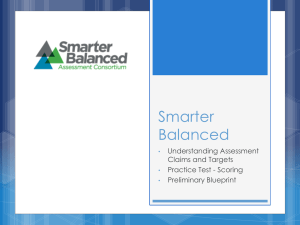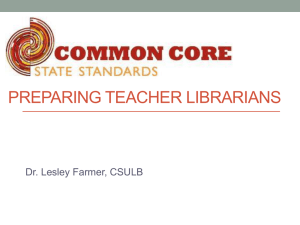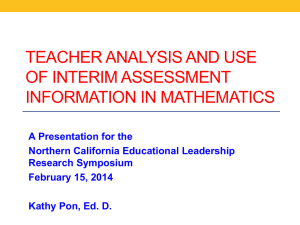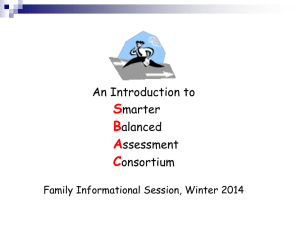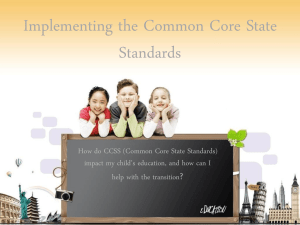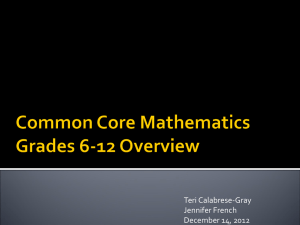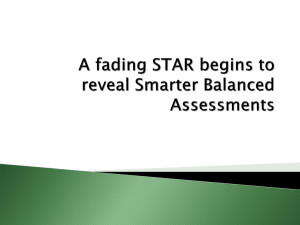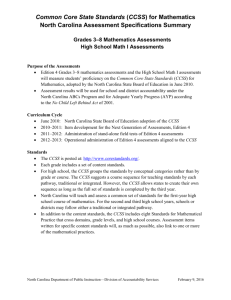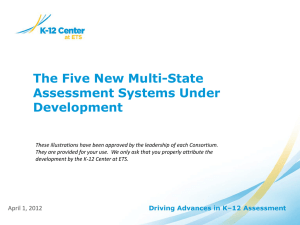SVMI Leading the Way for CCSS - Silicon Valley Mathematics Initiative
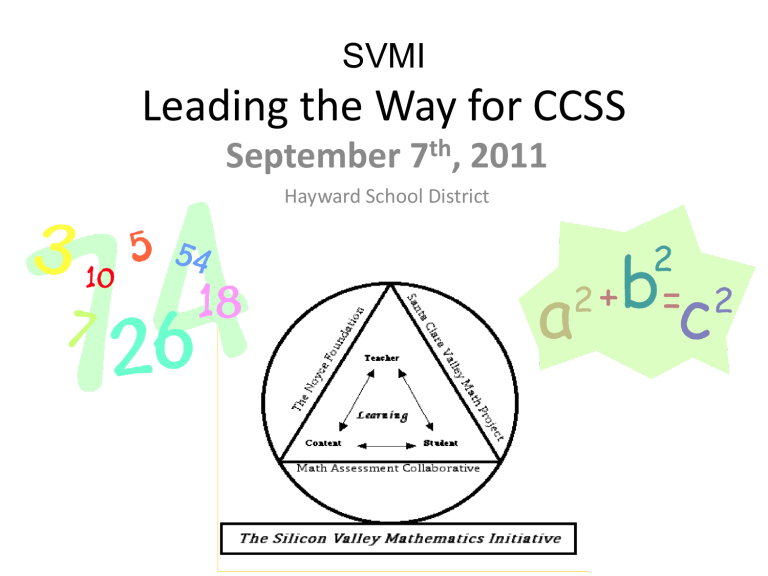
SVMI
Leading the Way for CCSS
September 7 th , 2011
Hayward School District
Assessment for Learning
In the Era of the
Common Core
Standards
David Foster
Silicon Valley Mathematics Initiative www.svmimac.org
45* States, DC, and US Virgin Islands Islands
*Washington and Idaho have adopted the CCSS conditionally/provisionally
** Minnesota has adopted the CCSS in ELA only
3
Race to the Top Assessment Program
In September 2010, the U.S. Department of Education awarded $350 million of Race to the Top Funds as grants to the two consortia:
• Smarter Balanced Assessment Consortium (SBAC)
• Partnership for Assessment of Readiness for College and
Careers (PARCC)
Task: To design and develop common K-12
Mathematics and English language assessment systems aligned to common, college-and careerreadiness standards.
SMARTER Balanced Assessment
Consortium
• Alabama
• *California
• *Connecticut
• *Idaho
• *Kansas
• *Maine
• *Missouri
• *Nevada
• North Carolina
• Ohio
• *Oregon
• South Carolina
• *Utah
• *Washington
• *Wisconsin
• Wyoming
• Colorado
• Delaware
• *Hawaii
• Iowa
• Kentucky
• *Michigan
• *Montana
• *New Hampshire
• North Dakota
• Pennsylvania
• South Dakota
• *Vermont
• *West Virginia
* Governing States
Caveats
• These assessment consortia are state-led initiatives with many players
Many decisions have not been made yet
-Some decisions are in flux
• The federal role is to provide support to the states for the development of innovative assessments
• There will be new assessments in 2014-15
-How innovative will the new assessments be?
Intention of SBAC Design
To strategically “balance” summative, interim, and formative assessment through an integrated system of standards, curriculum, assessment, instruction, and teacher development, while providing accurate year-to year indicators of students’ progress toward college and career readiness.
Center for K-12 Assessment and Performance Management at ETS
Current vs. CCSS
Current STAR Assessments Proposed CCSS Assessments
•
•
•
• Grades 2-11, writing at 4 and 7 th
Taken around 85% of the instructional days
Only multiple choice accountability system th
Only paper & pencil option
• Part of the state and federal
• Grades 3-8 and 11, Grades 9 and 10 available for states that choose to use them
• Delivered via computer (Paper and pencil option available for 3 years) and are computer adaptive
• Taken during the final 12 weeks of school
• Performance tasks and comprehensive end-of -year computer adaptive assessment which will some selected response items
• Accountability system has not been established yet
Proposed Elements to the Common
Assessment
• Online testing
• College and career-readiness assessment aimed at 11 th grade
• Rapid reporting system to inform instruction
• Teachers involved in developing and scoring tests
• Item types
– Short constructed response
– Extended constructed response
– Technology enhanced
– Performance tasks
– Selected response
Proposed Assessment System
Components
• Summative assessment (computer adaptive)
-supports accountability and measures growth
• Interim assessment (computer adaptive)
-Optional comprehensive and content cluster assessment
-Learning progressions
-Available for administration throughout the year
• Formative process and tools
-Optional resources for improving instructional learning
-Assessment literacy
The System
(Possible Scenario)
• 2011
Proposed Timeline
Development of formative tools, processes, and practices underway; Specifications for summative and interim assessments developed
• 2012 Summative and interim item development completed ; Interim item pool become available for use
• 2013 Field testing of items for adaptive summative assessment completed
• 2014
Preliminary achievement standards proposed and other policy definitions adopted
• 2015 Operational summative assessment administered; Final achievement standards verified and adopted
Center for K-12 Assessment & Performance Management at ETS
Types of Tasks in Mathematics
Novice
– short items focused on skills and routines
Apprentice
– medium performance tasks with scaffolding
Expert
– long tasks with high cognitive load and/or complexity.
SBAC’s Specifications for Math
• Written by Hugh Burkhardt and Alan
Shoenfeld as commissioned by Linda Darling
Hammond for SBAC.
• 60% of the SBAC will be assessed using performance assessment and scored using an analytic point scoring rubric (fashion after
MARS rubrics)
• 40% will be machined scored.
Exemplars in
Appendix
Silicon Valley Mathematics Initiative
53 Members School Districts and Charter School Networks
Antioch Unified
Aspire Charter Schools
Atlanta PS
Bayshore
Belmont
Berryessa
Bolinas - Lagunitas
Brisbane
Cambrian
Cristo Rey School Network
Cupertino
Discovery Charter School
East Side UHSD
Emery
Franklin - McKinley
Hamilton County, Tn
Hayward
Jefferson
Las Lomitas
Los Altos
Los Gatos
Menlo Park
Moreland
Morgan Hill Charter School
Mountain
Mt Pleasant
National Council of La Raza
New York City
Oakland Military Institute
Oakland Unified
Pacifica
Pajaro Valley
Palo Alto
Pittsburgh USD
Portola Valley
Ravenswood
Salinas City Schools
San Carlos
San Carlos Charter School
San Francisco USD (Mission Dist)
San Ramon Valley
Santa Clara
Santa Cruz City
Saratoga
Scotts Valley
SCCOE County Court Schools
SMCOE County Court Schools
South Cook Service District
South San Francisco
Walnut Creek
Supporting Teaching and Learning of Mathematics Since 1996
• September 27 or 29
• October 18 or 20
• November 15 or 17
• December 6 or 8
• January 24 or 26
Locations: Tilden Center, Oakland (Tuesdays),
Moreland DO (Tuesday), Nesbit School Thursday,
Pajaro Valley DO (Thursday)
Principal As Instructional Leader
• Patrick Callahan – Assistant Director of the
California Math Project
• TBA
Dates:
• Wednesday November 30
• Thursday February 2
General MAC Meetings
• MAC Final Report and Tools for Teachers
(October 5th at Santa Clara DRC)
• Distribute MAC 2012 Tests and Test Guidelines
(February 8 at Santa Clara DRC)
• MAC 2012 Preliminary Results, ISR
(May 16 at Fremont DO)
Other SVMI Events
• Lesson Study Project
• Math Network Meetings
• MAC Assessments – First Grade
• CCSS Transition Units
• Shell Centre Formative Assessment Lessons
• Number Talk Resources
• Problems of the Month
CCSS aligned Unit Outline
Welcome to the Inside Mathematics Website
Welcome to Inside Mathematics, a professional resource for educators passionate about improving students' mathematics learning and performance.
This site features classroom examples of innovative teaching methods and insights into student learning, tools for mathematics instruction that teachers can use immediately, and video tours of the ideas and materials on the site.
Several allied initiatives dedicated to improving math teaching have contributed to this resource.
http://www.insidemathematics.org
Field Testing of MAC Tasks
Field Test in the Next Grade Level
• 4 th Grade (Entire Test)
• 5 th Grade (Entire Test)
• 6 th Grade (Entire Test)
• 7 th Grade (one task)
• 8 th Grade (two tasks)
• Course 1 (one task)
